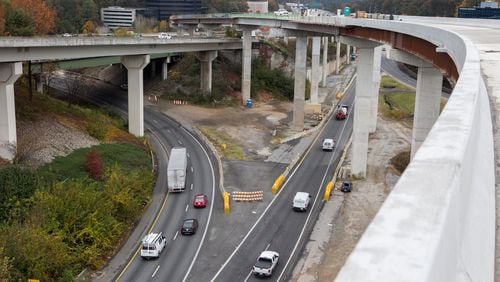Imagine driving 30 miles on metro Atlanta highways at the height of rush hour – and arriving at your destination in less than an hour.
Imagine knowing your morning commute will consistently take 45 minutes – instead of worrying that a fender-bender will snarl traffic and make it twice as long.
Imagine running late for work, but knowing there’s a wide-open lane of traffic that will help you arrive on time.
For commuters jaded by some of the world's worst traffic, it sounds too good to be true. But Georgia officials say it's already reality in parts of metro Atlanta and soon will be in Cobb and Cherokee counties.
The Northwest Corridor Express Lanes – set to open next summer – will stretch 30 miles on I-75 and I-575 northeast of Atlanta. State transportation officials say the limited access "express lanes" will whisk drivers from Acworth or Canton to the Perimeter in minutes, even if traffic in the regular lanes is at a standstill.
The project is part of a planned 120-mile system of metro Atlanta toll lanes that state transportation officials say will make commuting easier and more predictable for those willing to pay by the mile. That system already exists on parts of I-85 in Gwinnett County and I-75 in Clayton and Henry counties. Eventually, it will include the top half of the Perimeter and Ga. 400.
The $834 million Northwest Corridor is the longest leg of that system to date. And it’s already captivated motorists stuck in stop-and-go traffic.
“All the calls I get are, ‘When can we use them?’” said Stephen Lively, the Georgia Department of Transportation manager in charge of the project. “People are getting excited.”
But the express lanes also have generated criticism. Some say they’re “Lexus lanes” that help only those who can afford them.
Love them or hate them, they’re a big part of the state’s plan to fight the region’s traffic congestion. And more are on the way.
A 30-mile construction zone
Since work began in 2014, the Northwest Corridor Express Lanes have been construction on a colossal scale. So far, the project has required 155,000 cubic yards of concrete, 300,000 tons of asphalt, nearly 5.3 million pounds of steel and a million feet of fiber optic cable.
About 400 people work on the express lanes daily – down from 900 at the peak of construction in 2015.
"Thirty miles is not an everyday type of project," said Oscar Romero, a senior project manager at HNTBCorp., a consultant on the project.
Most of the work north of the I-75/I-575 split is complete. But don’t expect to drive on any portion of the lanes until the entire project is finished. The express lanes are a closed system, and no part can be opened until all the work is done.
The project includes two new lanes on I-75 from the Perimeter to I-575. There will be one lane each on I-75 and I-575 north of their intersection.
Like the I-75 South Metro Express Lanes that opened in Clayton and Henry counties in January, the Northwest Corridor lanes will be reversible. They will carry traffic into Atlanta in the morning and out of the city in the afternoon.
Motorists who use the lanes will have to have a Peach Pass and pay a toll. The price goes up as traffic increases. The idea is to keep the price high enough to discourage most people from using them – and guarantee traffic in the express lanes moves at least 45 m.p.h.
GDOT Commissioner Russell McMurry said that guarantee will make traveling more predictable. And he said you don’t have to use them all the time to benefit. If you’re running late to a meeting or your kid’s soccer game, the express lanes become more appealing.
“It’s truly an option that you can choose to use when you need to do so,” McMurry said.
When the lanes open next year, motorists who use them will be able to save up to 43 minutes, depending on the length and direction of their commute, according to GDOT projections. The agency says other motorists also will benefit as more vehicles take the express lanes, freeing up space in the regular lanes.
A faster commute
Through October, motorist had taken 850,000 northbound and 890,000 southbound trips on the new I-75 South Metro Express Lanes. The State Road and Tollway Authority says northbound motorists moved 13 m.p.h. faster on average in the express lanes than those in the regular lanes; they moved 24 m.p.h. faster during the afternoon southbound commute.
Alan Moore, a Hawkinsville resident who visits Atlanta regularly, has noticed a difference. He said I-75 traffic in Henry County has been “an unmitigated disaster” for as long as he can remember.
“The express lanes have helped that,” Moore said. “They have made travel times more predictable and saved the stress of dealing with stop-and-go traffic.”
Others aren’t so thrilled. Alejandro Arteaga, a Decatur resident who travels across the region, said Atlanta traffic continues to get worse, not better. And he considers the express lane tolls – up to 90 cents a mile – to be “outrageous.”
“Only people with money or company vehicles can use these lanes,” Arteaga said. “I thought the highways were built for everyone and not for the benefit of a few.”
Like them or not, there are more on the way.
An extension of the existing I-85 express lanes is set to open next fall. Within a decade, express lanes also will begin to rise along Ga. 400 and the northern half of the Perimeter.
The express lanes are a big part of the region’s plan to fight traffic congestion in coming decades. New mass transit lines and other improvements also are included in the region’s long-range transportation plan.
But don't expect traffic woes to end. Even if the region builds every road and transit project in its plan, traffic is still expected to get worse as Atlanta adds another 2.4 million people by 2040, according to the Atlanta Regional Commission.
Still, state officials say the express lanes will help.
“This is not the complete answer,” said Joe Carpenter, GDOT’s director of public-private partnerships. “But it is part of the answer.”
MYAJC.COM: REAL JOURNALISM. REAL LOCAL IMPACT.
The AJC's David Wickert keeps you updated on the latest in what's happening with transportation in metro Atlanta and Georgia. You'll find more on myAJC.com, including these stories:
Never miss a minute of what's happening in Atlanta transportation news. Subscribe to myAJC.com.







